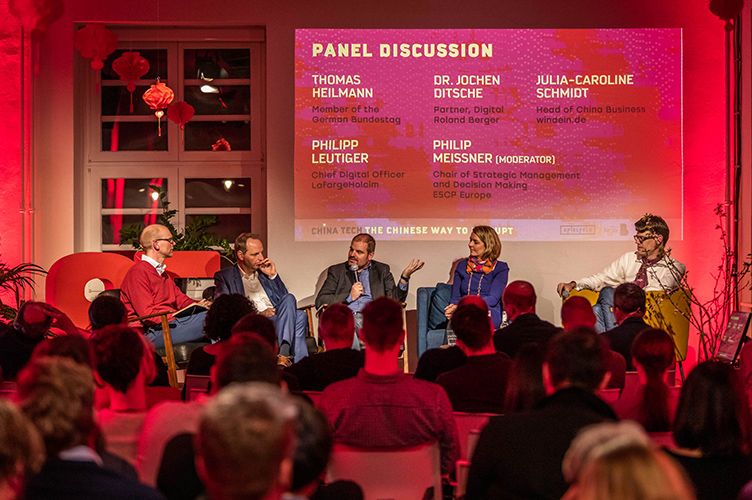On March 27th, over hundred people at the sold-out venue of Spielfeld came together to learn more about innovation in China and what can be learned from their approach. The event was jointly organized by Spielfeld, Roland Berger and ESCP. 3 keynotes emphasised different approaches to innovation from Chinese companies. These were followed by a panel that took a more European perspective and asked what can be learned from the Chinese way to disrupt from an ecosystem, business and start-up perspective.
The first speaker, Hui Zhang from NIO, shed light on the market for electric mobility in China and the need for global co-opetition in the industry. With his presentation he emphasised that NIO strives to redefine the customer journey of driving by enabling a user experience beyond the functionalities of getting from A to B. As the central element for re-thinking the user experience, he presented the NIO App that enables a convenient one-stop solution for customers in many use cases. The value of the application and the community idea behind it became visible by the number of app-users, which already today exceeds the number of NIO cars on the road.
The second speaker, George Huang from SenseTime, not only presented the AI ecosystem in China but also gave interesting insights into the interaction between the central government and businesses. He gave an overview of the state of AI in China and showed also the high future funding opportunities for the sector in China.
The third speaker, Xiaohu Wang from Haier, not only presented the reasons for exploring the “why behind the buy” in the refrigerator market but also described Haier’s transformation process towards a user-centric company trying to foster user loyalty through community interactions. The rapid growth of the company and the hundreds of millions of active users, which offer enormous sales potential within the scope of intelligent service solutions, have left a lasting impression on the audience.
Inspired by the keynotes, the final panel with opinion leaders from the fields of politics, consulting and business discussed European opportunities to learn from the Chinese approaches to innovation. Moderated by Professor Meissner from ESCP, the discussants quickly agreed that the Chinese success story in terms of growth and energetic motivation should be a “wake-up call” for the German industry. Henceforth, it became evident that in order to compete it will not be sufficient to remain the entrepreneurs of the past anymore. Here the discussion picked up speed and called the entrepreneurs to go and explore markets outside of saturated Europe and to tackle the volume of the internet of need instead.
In sum, the keynotes, as well as the panel discussion, have shown that China cannot be understood in terms of scale by European standards and have illustrated that the German industry is well advised to choose the right peer group and focus on their Chinese competitors in terms of determination, use of technology and growth to stay globally competitive.
Campuses
